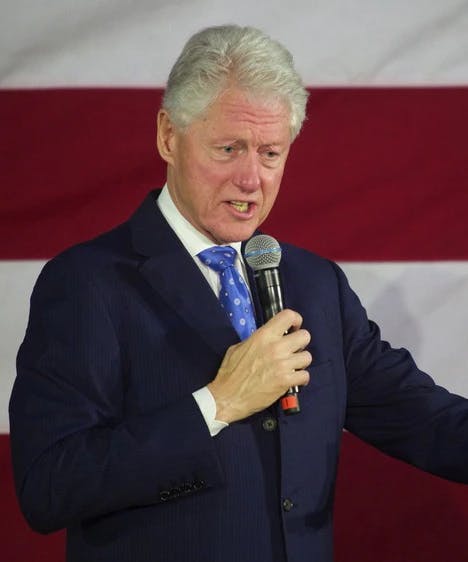Why Is Bill Clinton Immune To #MeToo Criticism?
In the fall of 2017, something amazing happened. The #MeToo movement took down some of the most powerful predators in modern American history like Harvey Weinstein, Bill O’Reilly, and Matt Lauer. More predators followed, but someone was missing.

That man was Bill Clinton, the 42nd President of the United States of America. Both Bill and Hillary Clinton recently appeared in the Hulu docuseries Hillary and addressed some of the sex scandals that plagued their marriage and his presidency. With these stories resurfacing, so has the discussion on whether or not Bill Clinton belongs in the same camp as Weinstein, O’Reilly, and Lauer.
The Accusations against Clinton
Before the Monica Lewinsky story broke, some of the more well-known cases of Clinton’s sexual misconduct were the stories of Juanita Broaddrick, Kathleen Willey, and Paula Jones.
In 1978, Broaddrick was a 35-year-old nursing home administrator and Clinton was Arkansas state attorney general. She came forward in 1999, claiming that Clinton originally wanted to meet with her at a hotel coffee shop, but instead requested she’d meet him in her hotel room, where he raped her. Broaddrick says, "There was no remorse. He acted like it was an everyday occurrence. He was not the least bit apologetic. It was just unreal."
There was no remorse. He acted like it was an everyday occurrence. He was not the least bit apologetic.
In 1991, Jones was working for the state of Arkansas and received a request to meet then-Governor Clinton in his hotel room. Jones, then 24, was told that this was an ordinary occurrence and felt completely safe in his presence. Things took a turn for the worst when she entered the hotel room, where she says, "He sat down, pulled down his pants, his whole everything and he was exposed, and I said, 'I'm not that kind of girl, and I need to be getting back to my desk.'" When she left, he told her to keep quiet.
Willey was a volunteer at the White House correspondence office in 1993 when Clinton assaulted her. She considered him to be a friend and asked for a full-time job in the White House to help with her family’s financial struggles. During that meeting, she claims that he kissed her, touched her breasts, and made her touch his crotch.
Clinton denied all accusations and the media stood by Clinton’s side, resorting to blaming the women for what happened to them. He was a public figure during all three of these incidents, leading these women to believe that he was someone who could be trusted. What truly amazes me is that if these stories had come out in the #MeToo era, Clinton likely would have been held accountable.
Monica Lewinsky
Lewinsky was in her early 20s when she became a White House intern and eventually got a job in the legislative affairs office of the White House. In 1995, she began an affair with President Clinton, who was in his late 40s. The details of the affair are well-known and graphic, but they’ve resurfaced during the #MeToo era as to whether or not it was taking advantage of an imbalance of power.
Lewinsky, now 46, has become an anti-bullying advocate. She wrote about her experience in 2018 for Vanity Fair and how her reflection on the scandal has changed in the #MeToo era, and how Clinton abused the imbalance of power. She wrote, “He was my boss. He was the most powerful man on the planet. He was 27 years my senior, with enough life experience to know better. He was, at the time, at the pinnacle of his career, while I was in my first job out of college.”
Clinton took advantage of the imbalance of power.
Lewinsky was a willing participant in the affair, though it can be debated as to whether or not it was entirely consensual by #MeToo standards. But one thing everyone can agree on is that Clinton took advantage of the imbalance of power. He saw a starry-eyed young woman who had a crush on him, and as the most powerful man in the world, he took advantage of her. If that isn’t a gross example of a power imbalance, I don’t know what is.
In Hillary Clinton’s latest documentary, Bill addressed the affair. He said he felt remorse, but also said his inappropriate actions were his way of coping with anxiety. Seeking help for anxiety was much more stigmatized in the 1990s than it is today, but this has to be one of the most pathetic excuses I’ve ever heard. He could have talked to a medical professional, exercised, meditated, or anything else healthy that didn’t involve cheating on his wife and taking advantage of a young woman. His choice to resort to sexual aggression goes beyond unhealthy - this is the behavior of a predator.
Why Does Clinton Get Away with It?
After extensively researching this topic, I cannot give a definitive answer as to why Clinton seems to be immune to the criticism of the #MeToo movement. The only reason I can think of is that it would tarnish his legacy as a president as well as Hillary’s legacy as a women’s rights advocate. However, this is a poor excuse. Nobody should be excused for sexual assault, harassment, or misconduct. Nobody, not even a former President of the United States, is above the law.
Nobody, not even a former President of the United States, is above the law.
Closing Thoughts
There is no doubt in my mind that Clinton should be placed in the same category as predators like Weinstein, Lauer, and O’Reilly. All of these men had plenty of power over these women and abused it by taking advantage of them. It’s not only disgusting and unacceptable, but it’s also a crime and a gross abuse of power.